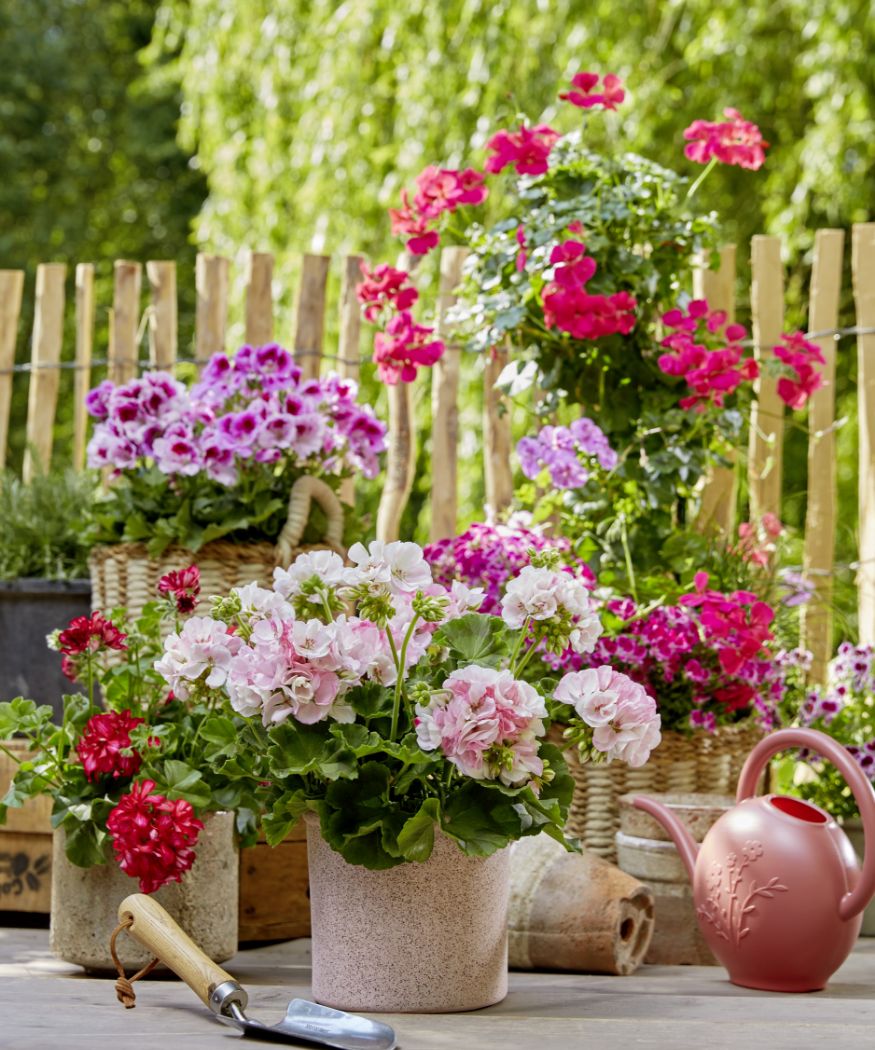- 20.06.2023
Boost for the horticultural sector in Eastern Europe
EU campaign boosts promotion for pelargoniums and poinsettias in six Eastern European countries for the first time

EU campaign boosts promotion for pelargoniums and poinsettias in six Eastern European countries for the first time
Pelargonium for Europe (PfE) and Stars for Europe (SfE) are collaborative marketing initiatives backed by leading European plant breeders, founded with the goal of securing long-term sales of pelargoniums (PfE) and poinsettias (SfE) in Europe, aiming to support the wider horticulture sector. The initiatives currently lead active promotion campaigns in 22 European countries.
On 1 March 2023, a new EU programme ‘Stars Unite a Europe in Bloom’ was launched in Bulgaria, Croatia, Czech Republic, Hungary, Romania, and Slovakia, to run until February 2026. This three-year EU-funded campaign covers these six Central and Eastern European countries for the first time. EU funds enable a significant expansion of previous activities in these countries with extensive holistic campaigns, and a corresponding boost in targets and reach.
The new EU campaign is already well-underway, having almost completed its first pelargonium season in spring 2023 and now beginning preparation of poinsettia materials ahead of autumn and winter. So far, highlights include the publication of many tier-one media clippings, such as a piece in major Hungarian tabloid newspaper Blikk which shared seven top tips for pelargonium care. The campaign has also been present at major events across Eastern Europe where pelargonium plants, posters and displays have been showcased to consumers and industry professionals.
Poinsettias and pelargoniums are the flagship products of European ornamental horticulture. Every year, around 100 million poinsettias and about 400 million licensed pelargoniums are produced in Europe. As the plants perfectly complement each other seasonally, with one season beginning soon after the other ends, many horticultural businesses grow both pelargoniums and poinsettias. Both products are often produced and sold regionally or locally, as such, securing their sales can support stability of the sector, and with less transport emissions compared to other products.
The members of SfE and PfE are world leaders in the breeding of ornamental plants and continuously cultivate new, high-quality varieties of pelargoniums and poinsettias. Over the years, they have succeeded in significantly improving the longevity and hardiness of varieties available in Europe, as well as constantly increasing the range to include more colours and forms.
Today, pelargoniums and poinsettias represent the quality and diversity of modern plant breeding and production, versatility with their wide array of decorative styles and uses, tradition as they both hold a special cultural role across Europe, and modern production methods in which sustainability plays an increasingly important role. These elements are reflected in the EU programme, together with its aim to increase local production and promote knowledge exchange among growers across Europe on innovative techniques and technologies in ornamental plant cultivation. The campaign comprises a mix of consumer-targeted promotion to raise awareness of the benefits of pelargoniums and poinsettias, combined with trade-targeted information, tools, and sales support.
The members of SfE and PfE are world leaders in the breeding of ornamental plants and continuously develop new, high-quality geraniums and poinsettias. Over the years, they have succeeded in significantly improving the longevity and hardiness of varieties available in Europe, as well as constantly increasing their range. Today, geraniums and poinsettias represent the highest quality, diversity, versatility, tradition and modern production methods, in which sustainability plays an increasingly important role.
This is also reflected in the current EU programme. Its aim is to increase local production and promote the exchange of knowledge among growers across Europe on innovative techniques and technologies in European ornamental plant cultivation, as well as to raise awareness of the pelargonium’s benefit. It also aims to encourage consumers to keep their plants for as long as possible.
Consumer activities include conventional PR attaining coverage in leading media channels, collaboration with media outlets and events from glossy magazines to national TV shows and festivals, plus cross-channel digital and social media activations. Consumer promotion is aimed at key target groups who are entering transformative stages of life when new behaviours are more easily picked-up – primarily those aged 50 to 65 (so-called ‘New Life Builders) and those aged 25 to 35 (‘Family and Career Builders’). To reach these groups, content is strategically designed to address different audiences and tastes.
Trade support for specialist retail includes materials for point-of-sale, industry communication sharing insights and sales advice, and participation with industry initiatives. Informative communication such as case studies and surveys on modern, sustainable production will reach producers and other levels of the supply chain.
In addition, all in the industry are encouraged to make use of the campaign photos, videos, and media content to support their own marketing activities. These materials are available to download from the campaign websites. Trade-oriented materials for the PfE campaign can be found at www.pelargonium-trade.com and for SfE at www.sfe-trade.com.
The breeder members of Pelargonium for Europe (PfE) are Dümmen Orange, Elsner PAC, Florensis, Selecta One and Syngenta Flowers. Members of Stars for Europe (SfE) are Dümmen Orange, Selecta one, Syngenta Flowers and Beekenkamp Plants. The initiatives were founded in 2016 and 2000 respectively, with the aim of promoting and securing long-term pelargonium and poinsettia sales in Europe.
The campaign now runs across 22 countries: Austria, Belgium, Bulgaria, Croatia, Czech Republic, Denmark, Finland, France, Germany, Greece, Hungary, Italy, Netherlands, Norway, Poland, Romania, Slovakia, Slovenia, Spain, Sweden, Switzerland, and UK. Activities are supported by the EU as part of the ‘Stars Unite a Europe in Bloom’ campaign from 2023 to 2026 in Bulgaria, Croatia, Czech Republic, Hungary, Romania, and Slovakia.